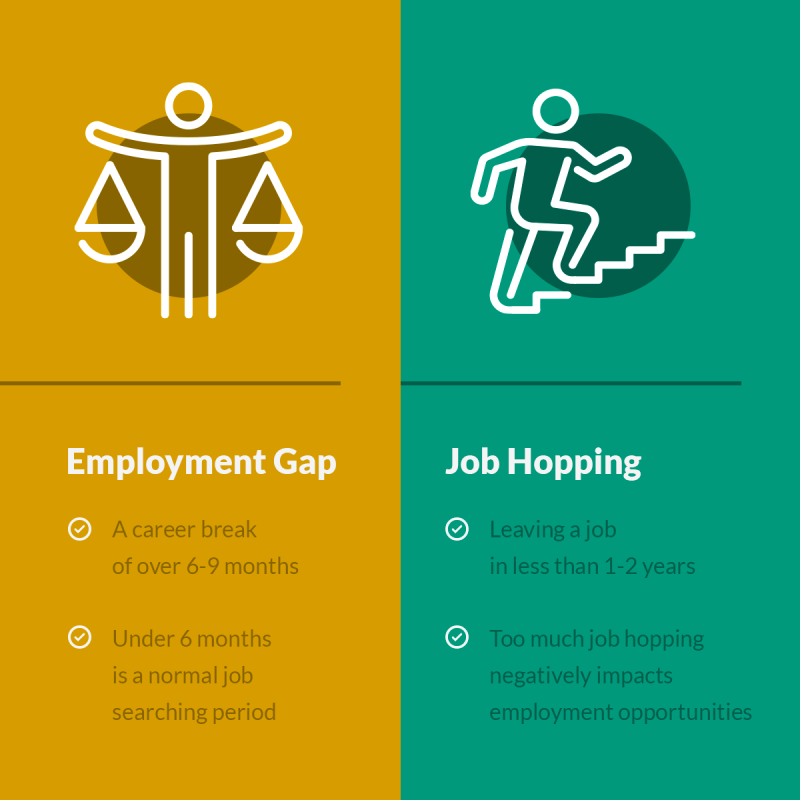In recent years, the job market has become very demanding. Having adequate skills and qualifications to match those posted in a job ad is often no longer sufficient. A well-written resume and cover letter are very important. It’s not just about style, linguistic correctness, and layout, but also about consistency of content and sticking to the facts. Both, in the resume and at the interview, it is not worth putting a gloss on your work experience. A common problem is the so-called employment gap, which is a period when a job candidate was unemployed. The reasons for employment gaps vary, but it is certainly not appropriate to hide them or lie about them in the recruitment process.
How to evaluate employment gaps on a resume? – table of contents:
- What are the reasons for employment gaps?
- A chance or a threat?
- Why hire someone with an employment gap?
- Summary
What are the reasons for employment gaps?
When preparing application documents, it often becomes problematic to explain the employment gap. Contrary to popular belief, long breaks in employment happen to many people. The first group of employees who interrupt their careers are parents who decide to take maternity and parental leave after the birth of a child.
Another reason may be taking unpaid leave or caring for a family member. In recent years, a year-long break also known as a “gap year,” or a vacation from employment to recharge batteries, understand your needs, distance yourself from current problems, or fulfill dreams, has also become popular. Other reasons for employment gaps are:
- an attempt to start your own business
- a try to find an attractive job
- raising the qualifications or changing the sector of operation
- emigration, undeclared work
- personal and health reasons
It is good to put and briefly explain the employment gaps on your resume. The fewer doubts at the beginning, the better the chances of moving on to the next stage of the recruitment process. Also at the job interview, the recruiter will most likely ask a question about the reason for the gaps in employment. A well-prepared answer is a chance to get your dream job.

A chance or a threat?
A career break is a rather complex issue, so it is difficult to determine clearly whether a candidate is less likely to be hired because of it. Many factors, such as the reasons and duration of unemployment, as well as the industry and the position for which the application is submitted, have an influence on the recruiter’s decision.
The task of the recruiter is to find a candidate who meets all the necessary requirements and is best suited for the job. Recruiters, when deciding whether to hire a particular candidate, analyze the opportunities and risks associated with the person and competencies.
This includes a detailed analysis of the employment gap, which in many recruitments may not be of any significance, and sometimes, for example, in the case of skills upgrading, may even be viewed positively. However, in some industries related especially to modern technologies, a break in professional activity is equivalent to a lack of up-to-date knowledge and necessary work experience.
If an employer is looking for a candidate with extensive knowledge and vast experience, then they will not hire a person who would require training and a much longer time to adapt to new responsibilities.

Why hire someone with an employment gap?
When making a decision to hire a particular candidate with a gap in employment, the reasons for the period of unemployment and skilfully presented arguments are crucial. People who have gaps in employment are not always inferior candidates, especially if they can convince a potential employer that it was not wasted time.
Employers are often enthusiastic about candidates who, while being unemployed, undertook various jobs. They see it as proof of resourcefulness, showing initiative, and an attempt to solve a crisis situation. Other arguments in favor of candidates with employment gaps are as follows:
- Volunteer work is always viewed in a positive way since it is a kind of professional activity.
- Running your own business, even if it was unsuccessful, shows a desire to grow and take on new challenges.
- Running your own professional blog often helps in getting accepted for marketing or public relations positions.
- Parental or maternity leave does not need to be unproductive either if you emphasize child care competencies, multitasking, and organizational skills.
- A long period of job search, if it involves upgrading skills, completing training courses, or learning a foreign language can also be seen in a positive light.
Is it worthwhile to give a chance to a candidate with a gap in their resume? There is no clear answer to this question as it depends on many factors such as the type of position, the reason for being unemployed, and how that time was used. However, such people can prove to be a valuable asset to the company.
Summary
When looking for job candidates, recruiters aim to find employees who are creative and committed to their tasks and duties. Therefore, the employment gap is usually thoroughly analyzed. However, this does not mean that it always has to be perceived negatively. If the candidate properly explains the reason why they were unemployed and points out the positive side of the situation, they will not only leave a more lasting impression, but also increase their chances of getting a job.
Read also: How can HRIS software boost employee engagement at work?
If you like our content, join our busy bees community on Facebook, Twitter, LinkedIn, Instagram, YouTube, Pinterest.
Author: Nicole Mankin
HR manager with an excellent ability to build a positive atmosphere and create a valuable environment for employees. She loves to see the potential of talented people and mobilize them to develop.


















